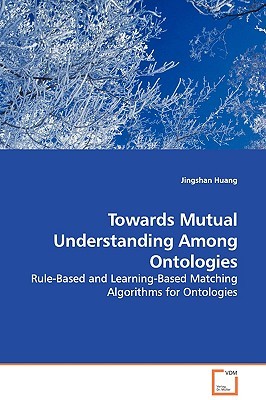
- We will send in 10–14 business days.
- Author: Jingshan Huang
- Publisher: VDM Verlag
- ISBN-10: 3639115562
- ISBN-13: 9783639115567
- Format: 15.2 x 22.9 x 0.7 cm, softcover
- Language: English
- SAVE -10% with code: EXTRA
Towards Mutual Understanding Among Ontologies - Rule-Based and Learning-Based Matching Algorithms for Ontologies (e-book) (used book) | bookbook.eu
Reviews
Description
Ontologies are formal, declarative knowledge representation models, forming a semantic foundation for many domains. As the Semantic Web gains attention as the next generation of the Web, ontologies' importance increases accordingly. Different ontologies are hetero-geneous, which can lead to misunderstandings, so there is a need for them to be related. The suggested approaches can be categorized as either rule-based or learning-based. The former works on ontology schemas, and the latter considers both schemas and instances. This book makes 6 assumptions to bound the matching problem, then presents 3 systems towards the mutual reconciliation of concepts from different ontologies: (1) the Puzzle system belongs to the rule-based approach; (2) the SOCCER (Similar Ontology Concept ClustERing) system is mostly a learning-based solution, integrated with some rule-based techniques; and (3) the Compatibility Vector system, although not an ontology-matching algorithm by itself, instead is a means of measuring and maintaining ontology compatibility, which helps in the mutual understanding of ontologies and determines the compatibility of services (or agents) associated with these ontologies.
EXTRA 10 % discount with code: EXTRA
The promotion ends in 17d.23:51:30
The discount code is valid when purchasing from 10 €. Discounts do not stack.
- Author: Jingshan Huang
- Publisher: VDM Verlag
- ISBN-10: 3639115562
- ISBN-13: 9783639115567
- Format: 15.2 x 22.9 x 0.7 cm, softcover
- Language: English English
Ontologies are formal, declarative knowledge representation models, forming a semantic foundation for many domains. As the Semantic Web gains attention as the next generation of the Web, ontologies' importance increases accordingly. Different ontologies are hetero-geneous, which can lead to misunderstandings, so there is a need for them to be related. The suggested approaches can be categorized as either rule-based or learning-based. The former works on ontology schemas, and the latter considers both schemas and instances. This book makes 6 assumptions to bound the matching problem, then presents 3 systems towards the mutual reconciliation of concepts from different ontologies: (1) the Puzzle system belongs to the rule-based approach; (2) the SOCCER (Similar Ontology Concept ClustERing) system is mostly a learning-based solution, integrated with some rule-based techniques; and (3) the Compatibility Vector system, although not an ontology-matching algorithm by itself, instead is a means of measuring and maintaining ontology compatibility, which helps in the mutual understanding of ontologies and determines the compatibility of services (or agents) associated with these ontologies.


Reviews